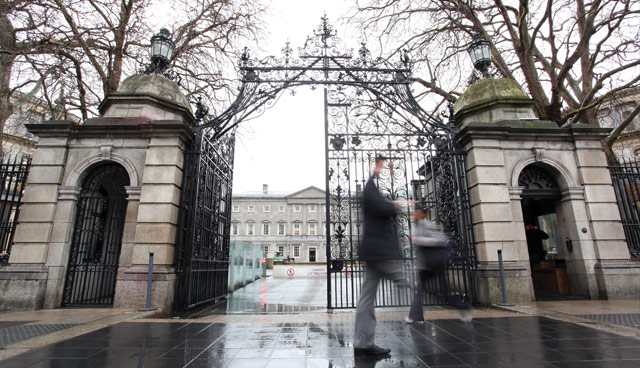Parliamentary Budget Office: Enhancing Oireachtas engagement


In 2017, following an OECD review of budget oversight by the Oireachtas and on the recommendation of the Sub-Committee on Dáil Reform, the Parliamentary Budget Office (PBO) was established. It is intended to be a source of financial and budgetary intelligence for Oireachtas members. Ciarán Galway meets with Director Annette Connolly in Kildare House to discuss its rationale, impact and vision for the future.
The origins of the PBO came from within the Oireachtas itself. In 2015, the Oireachtas asked the OECD to review the strengths and weaknesses of Oireachtas engagement in budgeting. This review found that, at that time, “most stakeholders do not consider that the Houses of the Oireachtas engages with the budget process in a meaningful or impactful way”.
As such, a key OECD recommendation was “the creation of an Irish Parliamentary Budget Office to provide specialist analytical support to parliamentarians so that they can carry out a more effective oversight and scrutiny role”.
“It was very much borne from a desire to ‘up the game’ in terms of Oireachtas engagement,” Annette Connolly notes. The OECD suggested that the role and responsibility of the PBO should include the provision of:
- technical and non-partisan analysis and briefing to support committee scrutiny at all key stages of the budget process;
- confidential budget analysis to support the work of individual parliamentarians;
- training to develop the capacity of parliamentarians in relation to financial scrutiny; and
- independent pro-active research in relation to the budget and performance budgeting.
“When the Oireachtas received the OECD report, it accepted the recommendations. Then, following on from the elections of 2016, there was a special committee set up on Oireachtas reform. That committee then recommended establishing the Oireachtas Committee on Budget Oversight and thrashed out the terms of reference. It was also agreed to establish a parliamentary budget office,” the PBO Director explains.
While the Oireachtas had initially assembled a three-person team as a basis for budgetary scrutiny, Connolly’s appointment in August 2017 is considered the starting date for the establishment of the PBO. “When I came on board, I then set out what I thought should be the Office’s role, based very much upon what the OECD had suggested. That was the blueprint,” she outlines.
“While it is important to recognise that the Government alone has the executive and constitutional authority on budget matters, the role of the Oireachtas is examining and scrutinising the management of the public finances by the Government.
“It’s about equipping the members of the Oireachtas with the information and the knowledge which they can then use to better interrogate government policy.”
Effective parliamentary engagement
So far in 2018, the PBO has produced around 50 documents, ranging from papers to briefing notes to infographics. The Office also produces Quarterly Economic and Fiscal Commentary. “This is to ensure that the members have access to information about what is happening in relation to budgetary issues and with regard to fiscal policy, on an ongoing basis,” Connolly explains.
In adhering to the principle of transparency, which the OECD includes as a crucial function for parliamentary budget offices, each time the PBO produces new material, it ensures that it is received by each member of the Oireachtas.
In particular, the PBO conducts a significant volume of its work alongside the Budgetary Oversight Committee. For instance, on occasion, Connolly will brief the Committee’s members on the Office’s publications in advance of them meeting with the Minister for Finance or with departmental officials.
“That is a component of the confidential work that we do and if we feel that there is something that they should be aware of then we will alert them to that,” she says.

On one hand, some of the PBO’s publications are produced in response to issues raised by Budgetary Oversight Committee members. “For example, one of those matters was gender budgeting and we asked the ESRI to undertake a study, which was published recently, on the impact of the last 10 budgets on women and men,” Connolly indicates. Likewise, the members asked the PBO to look at climate-proofing the budget and analyse the Rainy Day Fund.
On the other hand, some of the PBO’s work “is proactive and of we use our own initiative, including issues that we think are of relevance and that members should be aware of. We’re trying to strike a balance”.
Impact
A fundamental question concerns the PBO’s impact on the financial and budgetary scrutiny process. The Irish PBO is collaborates with and benchmarks against a network of parliamentary budget offices, particularly in Austria, as well as in Canada and Australia.
“One of the questions that we ask our counterparts elsewhere is, ‘how do you know that you’re having an impact?’ It sounds very basic, but it is about the level of debate in parliamentary committees and in the Dáil. Whether the level of debate is more informed and sophisticated,” she specifies.
Suggesting that there has been some degree of improvement in the standard of debate in the Oireachtas, Connolly indicates that the PBO monitors the instances when either its publications or the Office itself are referenced in debates. For example, a PBO document relating to public private partnerships was used extensively during a debate on capital infrastructure in April 2018.
“Anecdotally we hear from the officials that the members have our documents in front of them, not just at the Budget Oversight Committee, but other committees and debates in the House. Likewise, when members meet the Minister and the officials, and they do use our briefings and the guidance that we provide to them. This is characteristic of the impact we can have,” Connolly asserts.
The challenge now, for the PBO, is to broaden this impact beyond the Budget Oversight Committee. A component of this challenge is how best the PBO communicates with time-poor Oireachtas members. This means determining which types of publications are best received.
“This is not unique to us – it is something that our international counterparts also wrestle with. Reflecting on the tactics we utilise can have the most significant impact. We produce a mix of material and for Budget 2019 we established a physical presence in Leinster House itself.
“We are building our modelling capacity in a way that will allow us to level the playing field between the Government and the Oireachtas. Some of our economists are developing the models required to carry out sensitivity analysis in respect of tax revenue forecasts and to cost policy proposals.”
“During that time, we used our publications to interact with different members and introduced the Office and explained what it’s doing. There’s no point in producing fabulous pieces of research if they are not then disseminated. At the end of the year, we’ll engage with members to see if our work has landed with them and what impact we have had,” she discloses.
Structure and service evolution
Another challenge which is not unique to the PBO is staff retention. By May 2018, the Office had 13 staff, of whom eight were economists, three of which were PhD level. This was regarded by the Director as being “a really good critical mass”. However, during summer 2018 two staff members were promoted to different departments, while a third left to undertake further studies.
“Looking at other PBO’s internationally, I would be happy enough with the 13 or 14 people. It is important to have people with strong economic skills and policy analysis abilities alongside that. I am happy that this structure has the right blend of skills mix.”
Planning for 2019, Connolly wants to develop the PBO workplan in order to become more involved in financial costings. To prepare costings, it is essential that the Office is fully bedded down and has access to good data.
“We are building our modelling capacity in a way that will allow us to level the playing field between the Government and the Oireachtas. Some of our economists are developing the models required to carry out sensitivity analysis in respect of tax revenue forecasts and to cost policy proposals. Therefore, well in advance of the budget, members will be able to come to us with various different scenarios and we can run that ex ante analysis for them,” she reveals.
A deficiency of ex ante scrutiny of budgetary and financial issues generally is one of the weaknesses identified by the OECD’s report. Indeed, virtually all scrutiny of the budget is ex post.
“Simultaneously, we will also be trying to develop more blue-sky analysis in 2019. For example, analysing what the cost would be for a new policy measure or proposal. However, that is very much dependent on the PBO’s access to good quality data.”
Transparency and accessibility
Transparency is a theme that runs through many of the PBO’s publications, particularly in expenditure-related documentation, for example, around the spending review. The PBO advocates for enhanced transparency through the increased availability of information in a more readily accessible format.
“Last year, we did some work in relation to the first Public Service Performance Report. We made a number of recommendations in that with regard to transparency. In this year’s review, we will see whether or not they were taken on board.”
Referring to the Budget 2019 pack which was issued to everyone in the Dáil on budget day, Connolly acknowledges a “brilliant level of transparency” but also identifies the potential for information overload.
“[The language is] technical, so as much as anything else, one of the PBO’s jobs is to make it more readily accessible and to distil the information into bitesize chunks that members can actually engage with and understand,” she says.
Currently, the PBO’s engagements with the Budgetary Oversight Committee incorporate detailed and technical discussions about the economic issues, including: overheating; the economic cycle; and the output gap.
“There is a good level of understanding around those issues and quite a sophisticated discussion,” she says, adding: “The difficulty then still comes back to some of the language used. It’s not that anybody in the Department of Finance and Public Expenditure and Reform is trying to be obscure, it’s just that it is technical.”
Vision
When Connolly took charge of the PBO in August 2017, she established defined objectives for the first year and has a clear sense of direction for the years ahead.
Primarily, the Director wants to ensure that her Office becomes firmly embedded as an integral and respected feature of the budgetary landscape that is considered authoritative by internal and external actors alike. In that, she wants to engage with Oireachtas members regularly to diminish the perception of the Office as a specialist unit with an ambiguous remit.
“Another thing that is important is that the PBO becomes an office that economists aspire to work in. The ‘Holy Grail’ of these kind of offices is the Congressional Budget Office in the US. It is very prestigious, they attract PhD students and are a firmly established part of the fiscal landscape in the US. That is ultimately where I would like the PBO to be, on a much smaller scale of course.
“We also want to be able to say that the PBO is having an impact and that there is a much higher quality and standard of debate on budget issues in the Oireachtas. In terms of the impressions of it, we are probably on the right track and are certainly in line with what the OECD outlines should be the core work of parliamentary budget offices,” she concludes.





